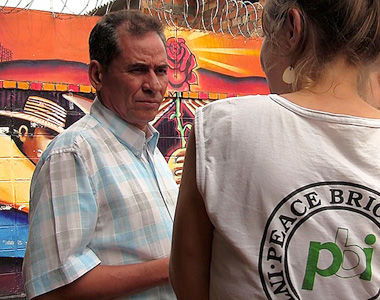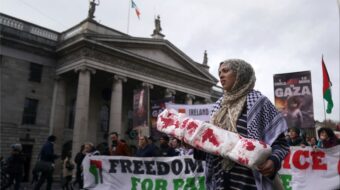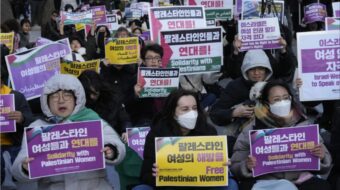
Responding to the imprisonment of Colombian human rights activist David Ravelo (and also the grim situation of political prisoners there), members of the North American Committee for the Defense of David Ravelo were in Colombia on Ravelo’s behalf in late November 2012. Details as to grave flaws marring the conduct of Ravelo’s prosecution and trial are delineated in a letter appearing below that they sent to Colombian Attorney General Eduardo Montealegre.
The delegation demanded freedom for Ravelo and protection for his family and colleagues in his native Barrancabermeja. Readers wanting to join the worldwide campaign for Ravelo are invited to endorse an action alert accessible at www.afgj.org .
Former student activist Ravelo was a leader in the USO oil-workers union and the librarians’ union of his local university. As a municipal official holder for the Patriotic Union he survived murderous attacks against that leftist electoral coalition. Ravelo is a 38-year member of the Colombian Communist Party, and since 1991, a member of its Central Committee.
In Barrancabermeja, Ravelo organized and led multiple human rights groups, among them the CREDHOS human rights organization and the regional section of MOVICE, an organization advocating for victims of state crimes. The Barrancabermeja Catholic Diocese honored him in 2008 for 35 years of human rights work.
Ravelo’s conviction on a trumped up charge of aggravated homicide was announced on Dec. 11, 2012. He was sentenced to 18 years and three months in prison. Since then dozens of European and U.S. human rights groups have condemned the judicial processes to which David Ravelo was subjected. In the United States, they included the Center for Constitutional Rights, Washington Office on Latin America, and United Steelworkers.
Colombia’s prison population, now including 10,000 political prisoners, has increased by 30 percent during the current presidency of Juan Manuel Santos. Recent reports highlight abysmal prison conditions: foul sanitary facilities, limited availability of potable water, inadequate medical services, and overcrowding. Many political prisoners serve two to three years without charges and are then released. The U.S. government has contributed funding for prison construction in Colombia
Letter to Colombian Attorney General
Here is the letter to Colombian Attorney General Eduardo Montealegre from the North American Committee for the Defense of David Ravelo:
January 10, 2013
Dear Dr. Montealegre,
We are members of a delegation of U.S, Canadian, and German citizens who visited Colombia for a week beginning November 25, 2012. Although our fundamental concern in regard to your country is the war and terrible suffering there, our visit was aimed at solidarity with David Ravelo, (cédula de ciudadanía 13.887.558), currently held in La Picota prison in Bogota. Mr. Ravelo was convicted December 11, 2012 of aggravated homicide in the case of Barrancabermeja mayoral candidate David Nuñez Cala, killed in 1991. He was sentenced to 18 years, three months in prison.
Prompting this letter is our realization, indeed our certainty, that the prosecution and judicial processes that led to Mr. Ravelo’s conviction do not meet internationally recognized standards of fairness and justice. We base our view on information gained before, during, and following our visit to Colombia. Our reasoning is as follows:
Mr. Ravelo was denied due judicial process. Prior to his conviction he had already spent over two years in prison. At his trial there was no opportunity for evidence on his behalf to be presented; 30 defense witnesses were prevented from testifying.
Testimony provided by two prosecution witnesses was self-serving. They were two former paramilitary leaders convicted of massacres. The testimony they offered against David Ravelo facilitated reductions of their sentences under terms of Law 975, Law of Justice and Peace. The sentence of one of them, Mario Jaimes Mejía, alias “El Panadero,” was reduced from 40 to no more than eight years. Another witness at Mr. Ravelo’s trial testified that the two principal prosecution witnesses had tried to bribe him.
We suspect that the principal motivation for prosecuting and convicting David Ravelo was political retribution. Mr. Ravelo, a leader of the National Movement of Victims of State Crimes (MOVICE, by its initials in Spanish), the Regional Corporation for Defense of Human Rights (CREDHOS), and other human rights organizations, is acknowledged and respected for his commitment to defending human rights in the Barrancabermeja region. In fact, his efforts brought public attention to paramilitaries, police, and members of the national army suspected of human rights abuses and thereby contributed to justice being applied. Mario Jaimes Mejía had been convicted in part because of David Ravelo’s efforts. Ravelo took the lead in publicizing ties between ex – President Alvaro Uribe and paramilitary groups.
The prosecutor in Mr. Ravelo’s case was William Pacheco Granados who had served as police lieutenant in Armenia in 1992. He was dismissed from that post because the year before he helped arrange for Guillermo Hurtado Parra’s forced disappearance. Under Colombian law (Article 76 of Decree 261/2000), that crime permanently disqualifies him from holding any public office, including, of course, that of public prosecutor. We hold that David Ravelo’s conviction is invalid because of this and other judicial and prosecutorial irregularities.
Members of David Ravelo’s family have received multiple death threats and been intimidated in other ways. His associates in the CREDHOS organization have also been threatened.
David Ravelo’s case is worrying on other accounts. The attorney general in Barrancabermeja in April 2009 determined not to prosecute David Ravelo. In response, jurisdiction in his case was re-assigned to the national Attorney General in Bogota where prosecution was resumed. Initial charges against Ravelo of “rebellion” were dropped on discovery that in 1995 he had been absolved of that charge (after two years in prison) and that reinstatement was impossible. Conveniently enough, the charge against David Ravelo switched to “aggravated homicide.” Six months elapsed between the end of David Ravelo’s trial proceedings in May 2012 and public notice of his conviction. Almost four weeks elapsed between November 16, 2012, the date officially assigned to his conviction, and December 11, 2012, the date when Mr. Ravelo and his legal defenders officially learned of his conviction.
We would remind your office that Colombia’s Constitutional Court under its decision T-590/98 has ruled that because defenders of human rights are vulnerable to attacks and abuse within the national context, the state must assume responsibility for protecting them.
We are encouraged by international calls for justice in David Ravelo’s case.
Since 2000, the Inter-American Human Rights Commission has extended “precautionary measures” for the protection of members of CREDHOS and its directors, including David Ravelo.
In November 2010, British parliamentarians called for his release from prison.
In March 2011, the United Nations Special Rapporteur on the Independence of Judges and Lawyers, Gabriela Knaul, and the Special Rapporteur on the Situation of Human Rights Defenders, Margaret Sekaggya, issued a joint communication to the Colombian Government expressing their concern that “criminalization of David Ravelo occurs in the context of increasing prosecutions against human rights defenders in Colombia”.
Irish solidarity activists visited Ravelo in prison in November 2012. One of them, Northern Ireland Assembly member John McCallister, commented that, “David Ravelo is an admirable man, dedicated to the defense of human rights. I am horrified that a human rights defender can be convicted in a case led by a prosecutor implicated in crimes against humanity.” McAllister joined 30 British and Irish parliamentarians, lawyers, and labor leaders in issuing a statement condemning David Ravelo’s conviction.
On 5 December 2012, the Inter- American Commission of Human Rights condemned repression against human rights defenders in Colombia including Mr. Ravelo.
On December 10, 2012, 13 European human rights groups sent a communication to your office denouncing David Ravelo’s conviction. http://www.fidh.org/Colombia-International-12579 Later that month 21 other human rights, labor, and lawyers’ groups based mainly in the United States and the United Kingdom sent a similar letter to your office. http://www.colectivodeabogados.org/IMG/pdf/Carta_al_Fiscal_caso_David_Rabelo.pdf
On December 10, 2012, your office received a letter from 80 members of the British Parliament who judged his conviction to be a “serious injustice and violation of his human rights.” http://prensarural.org/spip/spip.php?article9850
Mr. Montealegre, in view of these considerations we urge upon your office a turn toward fairness and justice in the case of David Ravelo Crespo. We will be content with nothing less than Mr. Ravelo’s immediate liberation. Additionally, our group demands that effective protection be provided for members of Mr. Ravelo’s family and members of the CREDHOS human rights organization. Lastly, we urge that, in accordance with Colombian law, William Pacheco Granados be removed from his position as prosecutor within Colombia’s judicial system.
With respect and in hopes that David Ravelo will receive justice, we are,
Sincerely yours,
(Names of delegation members)
Photo: David Ravelo (PBI Colombia)












Comments